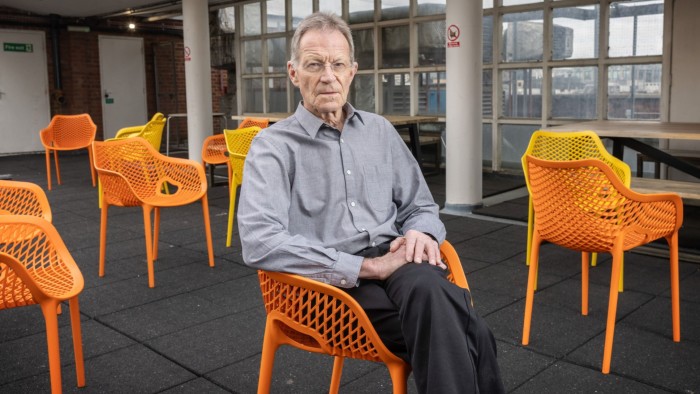Ministers risk curbing “liberty of thought” and stoking culture wars if they scrap the arm’s-length body for arts funding in England as part of their crackdown on quangos, the agency’s chair has warned.
Sir Nicholas Serota told the Financial Times that the Arts Council England was a “buffer” between artists and the government and that ending the arm’s-length model of backing theatres, museums and music groups would make it “easier for politicians to interfere”.
“The role of the Arts Council is to act as a protector of artistic freedom, and if we don’t have that freedom then we move towards living in a country where liberty of both thought and voice is constrained,” he said.
“We see plenty of places — look at the US now — where direct funding can be withdrawn as a result of a change of government. I think it’s pretty self-evident that that doesn’t benefit the arts or debate and dialogue within a society. It would sharpen divisions.”
Serota’s intervention comes as the UK government prepares to abolish or merge some of the more than 300 quangos — or quasi-autonomous non-governmental organisations — in a bid to save money and restore ministerial control over some areas of policy.
A separate review by Baroness Margaret Hodge, announced in December and due out next year, is examining the work, efficiency and governance of Arts Council England (ACE) but not whether the agency should exist.
In the US, President Donald Trump installed himself in February as chair of the Kennedy Center after purging the Washington arts venue’s board and vowing to end “anti-American propaganda”.
His administration has also moved to slash funding for museums and libraries and restricted which projects can win grants from the National Endowment for the Arts, an independent government agency.
Serota — who became ACE chair in 2017 and was reappointed for 18 months in January — said he expected Hodge’s review to be “tough but fair” and that the “strengths of the [current] British system” meant individual politicians could not influence which organisations received funding in the same way as in the US.
Founded in 1994 when the Arts Council of Great Britain disbanded, ACE received income of £797mn in the year to March 2024, about 70 per cent of which came from the government. In the same period it invested £716mn through multiple funding streams, with just under half going to the flagship “national portfolio” programme.
Launched in 2023, the 990-strong portfolio comprises renowned organisations such as the Royal Opera House, Royal Shakespeare Company and Ballet Black, as well as smaller ones including The Postal Museum, Midlands Arts Centre and Ledbury Poetry Festival.
Analysis published on Friday by consultancy Cebr on behalf of ACE set out nine “spillover effects” from public arts funding, including stimulating regional growth and the “crowding in” of private and overseas investment for new projects such as Aviva Studios in Manchester.
The cultural space, which opened two years ago on the former site of Granada Studios, expects to create 1,500 direct and indirect jobs over a decade.

Citing the government’s upcoming Spending Review, Serota said chancellor Rachel Reeves had an “opportunity to raise Britain’s cultural profile” and pointed to “plenty of examples, particularly on capital projects, where early investment by the public sector has given confidence” to the private sector.
“By Treasury terms it’s small scale, but a regional theatre or new gallery like the Hepworth Wakefield does have a big impact” on local communities, he added.
As arts funding comes under pressure from squeezed budgets, Serota, who was director of Tate between 1988 and 2017, said the UK should follow France in offering tax breaks to businesses that sponsor arts venues.
Introduced in 2003, France’s Aillagon law offers 60 per cent tax relief on donations, capped at 0.5 per cent of a company’s annual turnover.
“Given our rates of corporation tax [the UK main rate is 25 per cent], it would be a powerful incentive to companies,” Serota said, adding that Britain had not “played its soft power anything like as strongly as it could” in recent years.
ACE came under fire in 2022 when the agency slashed its grant to English National Opera and told the opera company to move outside the capital, after the then Conservative government ordered that £24mn a year be shifted away from London institutions as part of its “levelling-up” agenda.

Last month Wigmore Hall, the classical music venue in central London, hit out at red tape as it quit ACE’s national portfolio, having raised £10mn privately.
Culture secretary Lisa Nandy has pledged to ensure “arts and cultural institutions truly are for everyone, everywhere”, and London now receives one-third of ACE national portfolio funding, down from 41 per cent in 2018-23.
But while the agency wanted “access to the best in places that haven’t previously had it”, Serota cautioned that there was “a limit to how much [money] you can take out [of London] and expect the whole ecology to continue to function”.
Asked if the quango engaged well enough with the sector, Serota said ACE needed to “build trust” and was preparing to ease paperwork for grant holders.
“ACE does listen, but you can never listen enough. A really effective Arts Council would be seen by organisations as their voice, and there are times when we’re not sufficiently in tune with their concerns,” he said. “I’m not saying the Arts Council always gets it right . . . but I don’t think it has lost its appetite for advocacy.”





